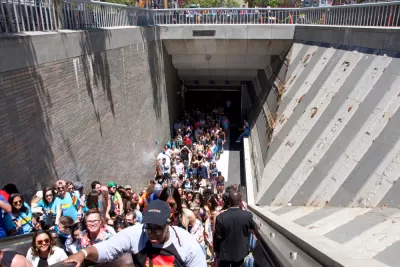With commuter ridership playing a smaller role in transit operations, agencies must reorganize their services around different travel schedules and patterns.

Writing in Governing, Skip Descant assesses how U.S. mass transit systems, which historically relied largely on commuter travel for the bulk of their ridership revenue, can adapt to new ridership patterns and adjust their services to serve new needs.
For transit agencies in Washington, D.C., where 66 percent of commuters now work from home at least part time, this is now an existential question. “Ridership on Metro, the network of trains and buses serving the nation’s capital, during the first six months of this year was down 64 percent compared to the same six-month period in 2019, according to the American Public Transportation Association (APTA).”
Some of the ways agencies are addressing these challenges: focusing on system reliability; removing friction points for users; launching more mobility options, like small shuttles linking restaurants and attractions; providing on-demand microtransit; and more focus on the first-mile/last-mile obstacles.
Transportation experts say agencies must rethink their service schedules, make it easier to access transit and make connections between systems, and focus on “transit planning that accommodates all of the other non-work trips we take — errand running, trips to schools and doctor’s appointments.”
FULL STORY: Commuter Ridership Is Disappearing. Can Mass Transit Adapt?

Alabama: Trump Terminates Settlements for Black Communities Harmed By Raw Sewage
Trump deemed the landmark civil rights agreement “illegal DEI and environmental justice policy.”

Study: Maui’s Plan to Convert Vacation Rentals to Long-Term Housing Could Cause Nearly $1 Billion Economic Loss
The plan would reduce visitor accommodation by 25% resulting in 1,900 jobs lost.

Planetizen Federal Action Tracker
A weekly monitor of how Trump’s orders and actions are impacting planners and planning in America.

Wind Energy on the Rise Despite Federal Policy Reversal
The Trump administration is revoking federal support for renewable energy, but demand for new projects continues unabated.

Passengers Flock to Caltrain After Electrification
The new electric trains are running faster and more reliably, leading to strong ridership growth on the Bay Area rail system.

Texas Churches Rally Behind ‘Yes in God’s Back Yard’ Legislation
Religious leaders want the state to reduce zoning regulations to streamline leasing church-owned land to housing developers.
Urban Design for Planners 1: Software Tools
This six-course series explores essential urban design concepts using open source software and equips planners with the tools they need to participate fully in the urban design process.
Planning for Universal Design
Learn the tools for implementing Universal Design in planning regulations.
Caltrans
Smith Gee Studio
Institute for Housing and Urban Development Studies (IHS)
City of Grandview
Harvard GSD Executive Education
Toledo-Lucas County Plan Commissions
Salt Lake City
NYU Wagner Graduate School of Public Service




























